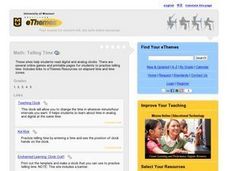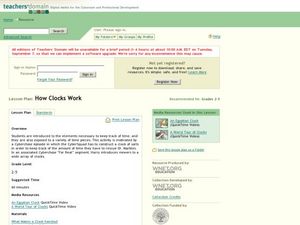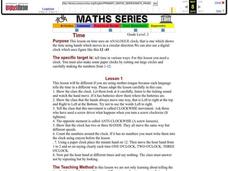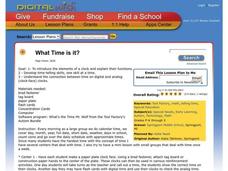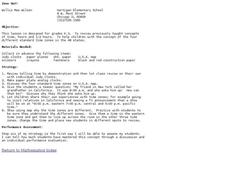Education World
Teaching Students to Tell Time: Three Resources for Busy Teachers
Elementary schoolers develop time-telling skills, one skill at a time. They examine the connection between time on digital and analog (clock-face) clocks. An excellent lesson on teaching how to tell time!
Curated OER
Telling Time With Clocks/Bingo “Time”
Young learners create a clock by adding hands and placing the numbers in the correct location. After each learner has their very own clock, they explore each component. Review on the hour times, and then introduce them to five-minute...
Curated OER
Telling Time - Online Games
A variety of resources are included here that will help your young learners tell time using either an analog or digital clock. The first resource listed, called "Teach Clock" is amazing! You can add or subtract time. Post it on your...
Alabama Learning Exchange
Time to Tell Time
Students demonstrate how to tell time using an analog clock. In this time measurement lesson, students read the book Clocks and More Clocks and use analog clocks to demonstrate the time that the teacher called out.
Curated OER
It's About Time!
Students examine concept of time, and explore difference between analog and digital clocks; students make art project to represent time and create a time-story problem and solution.
Curated OER
Hickory Dickory Doc Tell Time
Students discover time keeping by reading clocks. In this time-telling lesson, students read the story Hickory Dickory Dock, and discuss the measurements of time we use. Students complete worksheets in which they identify the...
Curated OER
Telling Time
Young learners participate in activities which help them understand analog clocks, and the vocabulary of telling time. They examine the values of the intervals of minutes and hours by making a human clock.
Curated OER
Telling Time Bingo
Have your youngsters examine the difference between digital and analog clocks. Using They participate in a "Telling Time BINGO" game. Not only is this activity fun, but it provides the teacher with an opportunity to informally assess his...
Curated OER
Telling Time as an Everyday Use of Numbers
How can we estimate time? Have your young mathematicians make a clock. Then they compare and contrast types of clocks. They practice writing times in two different ways and make a book about telling time.
Curated OER
Tick Around the Clock
Students examine and discuss the differences between clocks they are shown. Using the internet, they research how people used to tell time before clocks. They review what the long and short hand on the clock represent and practice...
Curated OER
How Clocks Work
Students discover time pieces and complete telling time activities. In this time lesson, students complete a worksheet about what make a clock keep time. Students watch a video about time and clocks as well as a video about an Egyptian...
Curated OER
It's About Time
First, second, and third graders explore elapsed time through estimation and prediction. They work with a partner to estimate how long it will take to perform various tasks. One person uses a stop watch to time his or her partner...
Curated OER
Time
Here, learners review telling time using an analog clock. They use a clock to tell time, make a paper clock, and discuss the concept of elapsed time. However, the lesson is not always easy to follow, nor are the questions clear.
Curated OER
Telling Time to 5 Minutes
Young scholars take part in various activities ranging from creating a human clock, to small group problem solving to reinforce the concept of telling time accurately to five minutes on an analog clock.
Curated OER
Telling Time - To the Hour
In this telling time worksheet, students write the time that is shown on 6 analog clock faces. They tell time to the hour in each example and write the time on the blank line below each clock face.
Curated OER
How To Measure Time
Students practice telling time on an analog clock. In this time measurement lesson, students use individual analog clocks to identify the hour and minute hand. Students identify how to tell time by moving the hour and minute hand.
Curated OER
Time to Five Minutes
In this math worksheet, students tell the difference between the hour and minute hands on a clock. They tell the time on four analog clocks to the nearest five minutes.
Curated OER
Time & Itineraries Two
Students explore time management by participating in clock reading activities. In this itinerary lesson plan, students define a list of time telling vocabulary terms and practice reading analog clocks with a partner. Students identify...
Alabama Learning Exchange
Mr. Crocodile's Busy Day
Demonstrate how to read analog and digital clocks to the hour in this time measurement lesson. Read the book What Time is it Mr. Crocodile? and use Mr. Crocodile's schedule to practice telling time. They work in cooperative groups to...
Curated OER
What Time is it?
Young scholars participate in three centers focused on developing time-telling skills. In this time lesson, students create their own paper plate clock face, play "Time Concentration" using times on the hour and half hour, as well as,...
Curated OER
Zone Out!
Students review telling time to the hour and half hour on an analog clock. In this time lesson, the students learn how to determine the time in each of the 4 standard time zones.
Curated OER
To The Clock of Eras
Third graders investigate the events of geological time using a chart called a "Clock of Eras". In this geological events lesson plan, 3rd graders compare a standard clock to a geological clock. In addition, students consider periods...
Curated OER
Keep Track of time by watching the clock
Young scholars answer questions about the clock. In this time lesson plan, students answer questions using intervals of five minutes. Young scholars solve problems about how long to the next activity, how much longer, and whether...
Curated OER
Clock Face
In this clock face worksheet, students cut out and assemble the labeled analog clock face and attach the hour and minute hands. There are no directions for use; the clock face is small.


